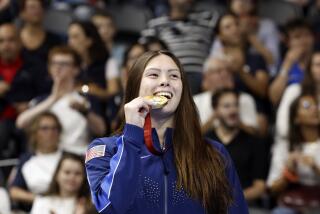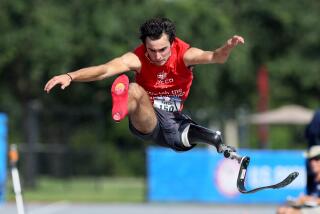Peirsol Is a ‘Horn of Plenty
Three men. Three strokes. Three world-record holders.
What exactly is it about the University of Texas and this sport not called football? Staying in the water to get out of the heat? Or is it what they are putting in the water in Austin? As backstroker Aaron Peirsol said recently, “That’s a good question. Pacifico ... with lime.”
U.S. Olympic Coach Eddie Reese, who also is the men’s swimming coach at Texas, has a simpler explanation about his star-laden squad, which will be contending for medals -- most of them gold -- this month in Athens.
“It’s not the culture. It’s not the water,” Reese said. “It’s the people in the water.”
There is the newest world-record holder, Brendan Hansen, who established marks in the 100-meter breaststroke and 200 breaststroke at the U.S. Olympic trials in Long Beach. In the 100, he became the first American to break one minute, going 59.30 seconds.
Then there is Ian Crocker, who holds the world record in the 100 butterfly and has consecutive victories over Michael Phelps at that distance.
And finally, there is Peirsol, the first of the three to set a world record, the 200 backstroke in 2002, and the first to win an individual Olympic medal, a silver in the 200 backstroke in Sydney, Australia, in 2000.
Hansen and Crocker made significant progress after arriving on campus in Austin. But Peirsol, who swam at Newport Harbor High and for the Irvine Novaquatics, already had an impressive resume. This unnerved the usually unflappable Reese.
“Aaron Peirsol came in with a world record in the 200 backstroke. I thought it was so fast, I was scared to death,” Reese said on the last day of the trials. “Because I didn’t know if I could get him to go to fast. After three weeks, I knew why he was a hard man to stop -- because he works hard, he races anybody.”
And at Texas, there was plenty of competition every day.
“We just push each other so well,” Peirsol said of his Texas teammates. “I’ve learned more the past two years than I’ve learned my entire career. Just from the guys I swim with.”
Peirsol, who gave up his college eligibility after completing his second year at Texas, invented a creative challenge one day at practice. Reese recounted one anecdote involving Hansen and Peirsol in the web diary he is writing for the Longhorns.
“Aaron will race anyone, any time, any place or any stroke,” Reese wrote. “In fact, he challenged Brendan Hansen in the breaststroke during the college season, making Brendan wear a T-shirt and shorts. Aaron came in second, but he was thinking of the next challenge.”
Phelps, who is pursuing Mark Spitz’s record for gold medals in an Olympics, represented that stern test. He mounted the first serious challenge to Peirsol in the 200 backstroke since the days of a completely healthy Lenny Krayzelburg. Peirsol had not lost a 200 backstroke since finishing second to Krayzelburg at the 2000 Olympics.
Phelps challenged Peirsol’s world record, then 1:55.15, barely missing it in February at Orlando, Fla., going 1:55.30.
“Aaron sweated that bullet,” said Dave Salo, who used to coach Peirsol and now works with Krayzelburg. “The athlete becomes very possessive of the time. They don’t want to see it broken. So the challenge of Michael to break the record was something that was eating at him.
“He was calling me minutes before Michael swam that race. I knew that was important to him. I didn’t realize it was that important.”
Said Peirsol: “Him being that close really did something for me. It was pretty sweet. I needed to wake up.”
His usual air of Southern California cool took another hit when he beat Phelps convincingly at the trials, 1:54.74 to 1:55.86, breaking his world record and celebrating exuberantly in the pool.
Now Peirsol will arrive in Athens nearly as heavily favored in the two backstroke races as Phelps is in two individual medley events and the 200 butterfly. In the 100 backstroke, Peirsol has the fastest time in the world this year, 53.64, while Matt Welsh of Australia is second in 53.78. Krayzelburg, the defending gold medalist, is the third-fastest, 54.06.
Phelps dropped the 200 backstroke from his crowded Olympic program, so the competition is even thinner in that event for Peirsol. The next-fastest time in the world in 2004, behind Peirsol and Phelps, is 1:57.42, by Gregor Tait of Britain.
“He’s not one to verbalize his goals,” Salo said of Peirsol. “I think he’d really like to take the backstroke down to the level of the 200 fly, 1:53. That’s probably down somewhere in his mind. There’s always that historical rivalry between the 200 back and 200 fly record.”
There is also a written goal, according to Peirsol’s mother, Wella.
“He’s got something on his kickboard,” she said of her son. “There’s a time he’s thinking about doing glued onto his kickboard.”
She wouldn’t give the number. But after the trials there was another fast-approaching number he was fretting. His 21st birthday was July 23.
“He loves his youth,” Hartig said. “He does not want to turn 20 or 21.”
Makes sense. After all, he usually makes numbers get smaller, not larger.
More to Read
Go beyond the scoreboard
Get the latest on L.A.'s teams in the daily Sports Report newsletter.
You may occasionally receive promotional content from the Los Angeles Times.







